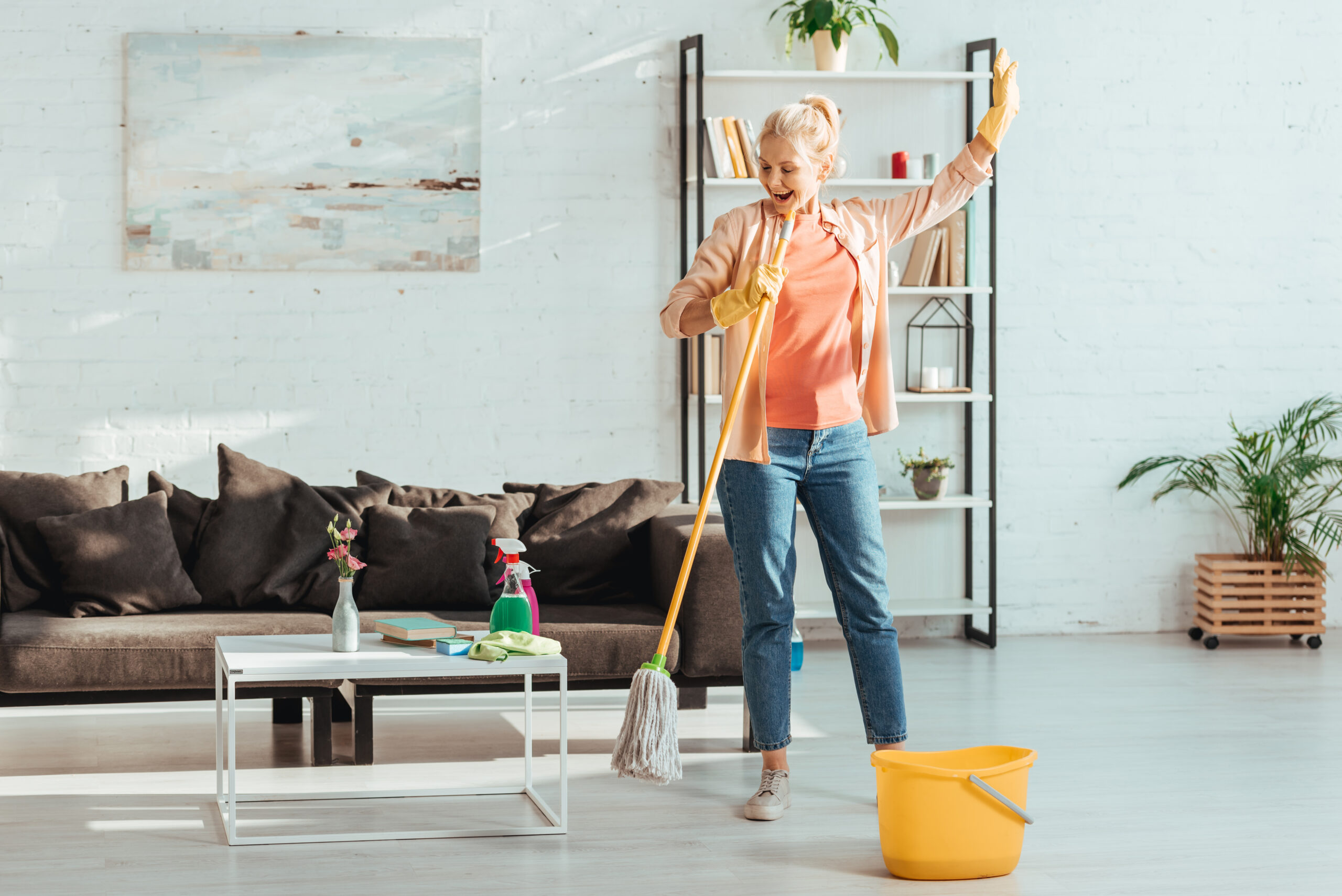Make Spring Cleaning a Success
The warmth of spring is upon us, which means many seniors are gearing up for their annual spring cleaning. While a deep clean can make your space feel easier to navigate, cleaning presents unique challenges for older adults. From navigating mobility concerns to ensuring safety during the cleaning process, seniors should approach spring cleaning with thoughtful planning and consideration. This guide aims to provide seniors with a wealth of practical spring cleaning tips and strategies to make their cleaning routine effective, safe, and enjoyable.
Creating a Spring Cleaning Plan
First, we’ll examine the importance of creating a thorough cleaning plan. One of our top spring cleaning tips is making a plan that considers seniors’ unique needs and capabilities. This will not only make cleaning a more efficient process, it will also help in avoiding common hazards.
Break Down Tasks
By breaking tasks down into manageable chunks, you can avoid the feeling of being overwhelmed before you’ve even begun. Start by conducting a walkthrough of each room in the home. Take note of areas that require additional attention. Kitchens and bathrooms, with their frequent use and potential for grime buildup, often demand intensive cleaning efforts. However, that doesn’t mean bedrooms, living areas, and outdoor spaces should be overlooked. A key part of this plan is dividing tasks over several days or even weeks. This helps seniors maintain their energy levels and prevent exhaustion, creating a more enjoyable cleaning experience.
Beyond simply breaking tasks down, seniors should also consider categorizing tasks. These categories could include the level of physicality each task demands, or time requirements. For example, tasks that involve heavy lifting or bending should be spread out over several days to prevent strain or injury. Tasks that require more time and concentration, such as organizing closets or deep cleaning carpets, should be tackled when seniors are feeling rested and focused.
Pacing and Prioritization
Once tasks are identified, it’s time to prioritize them based on urgency, importance, and the individual’s physical capabilities. Beginning with smaller, less physically demanding tasks can help seniors build momentum and motivation, propelling them forward in their cleaning endeavors. It’s equally important for seniors to pace themselves throughout the cleaning process. Taking regular breaks helps rest and recharge both body and mind. By setting realistic goals and spreading tasks out over time, seniors can avoid burnout as they work toward a cleaner and more organized living space.
Pacing oneself also involves knowing when to take breaks. Seniors should listen to their bodies and pay attention to signs of fatigue or discomfort. Taking short breaks to stretch, hydrate, or simply rest can help prevent overexertion. Additionally, seniors should be mindful of their energy peaks and valleys throughout the day, scheduling more demanding tasks during times when they feel most alert and energetic.
Safety and Mobility Considerations
Safety is paramount during spring cleaning, especially for seniors. These essential spring cleaning tips focus on addressing safety concerns and mobility issues, ensuring a secure and comfortable cleaning process.
Ensure Safety While Cleaning
Safety should always be the foremost consideration during spring cleaning. This is particularly important for seniors whose balance and mobility may be compromised. Start by ensuring that cleaning areas are well-lit and properly ventilated to minimize the risk of accidents and discomfort. Remove any potential tripping hazards, such as loose rugs, cords, or clutter. Seniors should also wear appropriate footwear with non-slip soles to provide traction on potentially slippery surfaces. Additionally, consider enlisting a family member or caregiver to assist with tasks that require bending, reaching, or lifting heavy objects. By following these safety tips, you can help prevent injury or strain while cleaning.
Address Mobility Concerns Before Cleaning
Mobility concerns should be taken into careful consideration when planning spring cleaning activities. Seniors with mobility issues may benefit from using assistive devices such as walkers, canes, or wheelchairs to move safely and comfortably throughout the home. Clearing pathways and removing obstacles that could impede movement is essential, ensuring that seniors can navigate their living space with ease. Consider using lightweight cleaning tools with adjustable handles and comfortable grips. For tasks that are more physically demanding, such as reaching high shelves or moving heavy furniture, don’t hesitate to ask for assistance or delegate these tasks to someone who can help.
Spring Cleaning Tips and Tools for Seniors
This section includes some helpful tips and tools for seniors doing their spring cleaning. From ergonomic cleaning tools to eco-friendly products, we’ll explore ways to make the cleaning process easier and more enjoyable for seniors.
Ergonomic Cleaning Tools for Seniors
Investing in ergonomic cleaning tools can make a world of difference for seniors. It will not only improve their safety while cleaning, but also their efficiency. Look for lightweight, easy-to-handle tools with adjustable handles and comfortable grips. These will allow seniors to clean with minimal strain and/or discomfort. Long-handled dusters, mops, and scrub brushes can help seniors reach high or low areas without overexerting themselves. Consider using microfiber cloths and mop pads, which are gentle on surfaces and highly effective at trapping dust and dirt, reducing the need for harsh chemical cleaners.
Seniors may also benefit from using assistive devices or adaptive equipment to make spring cleaning tasks more manageable. For example, seniors with arthritis or limited hand strength may find it easier to use cleaning tools with larger handles or built-in grips. Similarly, seniors with mobility issues may benefit from using lightweight vacuum cleaners or robotic cleaning devices that can help them clean hard-to-reach areas without straining their muscles or joints. By incorporating these tools and devices into their cleaning routine, seniors can reduce the physical demands of spring cleaning and make the process more enjoyable and accessible.
Avoiding Irritants and Harmful Chemicals
Many conventional cleaning products contain harsh chemicals that can have a negative health impact on seniors. Consider switching to non-toxic, eco-friendly cleaning products. Vinegar, baking soda, and lemon juice are effective natural cleaners that can tackle a wide range of cleaning tasks without the need for harsh chemicals. Some cleaning products may be labeled as “green” or “eco-friendly,” making it easier to find less harmful products for your home. By choosing safer alternatives, seniors can create a healthier home environment while reducing their ecological footprint.
In addition to using non-toxic products, seniors should be mindful of other environmental factors that can affect their health and well-being. For example, seniors with respiratory issues or allergies may benefit from using air purifiers or opening windows to improve indoor air quality while cleaning. Similarly, seniors should be cautious when using scented cleaning products or air fresheners, as these can exacerbate respiratory symptoms or trigger allergic reactions in some individuals. By being mindful of these environmental factors, seniors can create a safer and more comfortable cleaning environment for themselves and their loved ones.
Reviewing Spring Cleaning Tips for Seniors
Spring cleaning is not just about tidying up your living space; it’s about refreshing your home, rejuvenating your spirit, and reclaiming a sense of control and well-being. By approaching spring cleaning with thoughtful planning, prioritizing safety, and utilizing helpful tools and strategies, seniors can transform this annual chore into a rewarding and fulfilling experience. Remember to take breaks, ask for assistance when needed, and celebrate your accomplishments along the way.



Leave a Reply